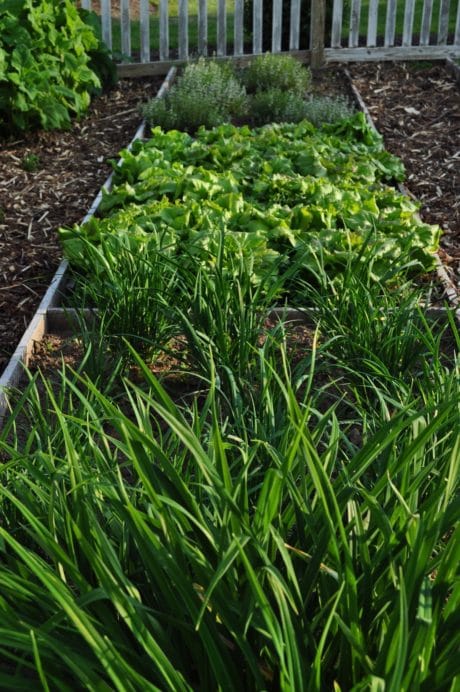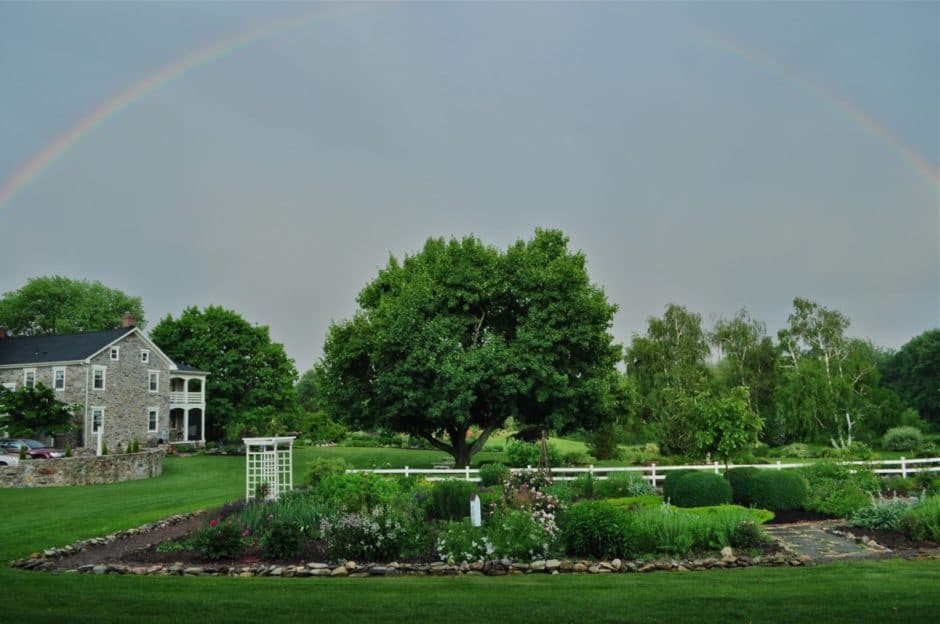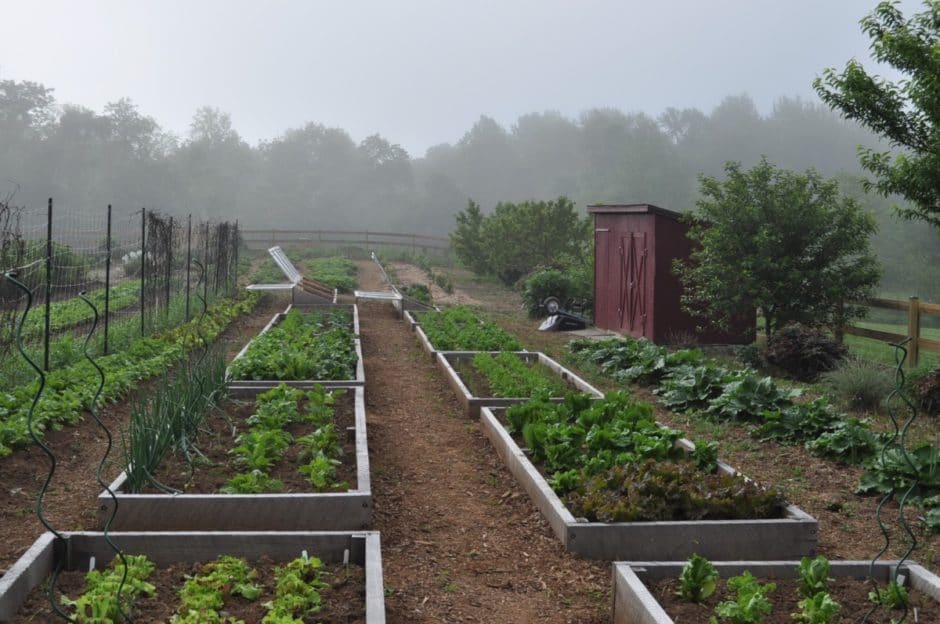Take one look at the Beech Springs Farm property and it’s clear that an avid gardener is dedicated to lovingly cultivating the farm’s natural surroundings. Owner Jayne Shord started gardening as a child on her family’s farm near Pittsburgh. Her lifelong passion with growing vegetables and flowers began when she discovered that by putting a twig in the ground from certain varieties of trees, they would take root. As a result, forsythia bushes and poplar trees flourished all over their yard.
When Jayne and her husband, Bill, moved to Beech Springs Farm, it offered the opportunity to expand her gardening skills. Overwhelmed by the amount of grass to cut on her 10.5-acre property, she did what any gardener would do. She went wild making gardens. Read on for some of Jayne’s expert tips when it comes to gardening, whether it’s an established bed or something new.
Tackling Tough Soil
Anyone living in Adams County knows of its rocky, clay soil. Once Jayne began creating garden beds, she found that the more she tilled the soil, the more rocks she overturned. Her solution was to create beds using a lasagna method of gardening whereby compost, leaves, grass clippings and straw are layered on the beds, which decompose over time and provide a fertile growing medium for vegetables and flowers. When crops are planted, the soil is lightly tilled to avoid turning up rocks and weed seeds. Jayne began using this method as a solution to poor soil, without realizing that there is actually a published book about the method. For her, this was her “top-down” approach to gardening.
Another strategy for rocky soil is paying particularly close attention to the plants that can grow in that environment. The large vegetable garden used to produce food for the Beech Springs Farm CSA is divided into four quadrants with crops rotated among three of the quadrants. Because of the rockiness of the soil, the fourth quadrant is designated for perennial crops of strawberries, blueberries, rhubarb and asparagus, while another area is devoted to raspberries. By doing this, Jayne found that even though the rocks are still there, they don’t pose as much of a challenge to gardening because they aren’t constantly overturned.
Composting
 At the end of the season, the garden is cleared of all debris to avoid providing habitat for overwintering garden pests. Beds are covered with compost and when possible, layers of shredded leaves and grass clippings are added to decompose over winter. As another growing season begins, what didn’t decompose is gently tilled into the soil.
At the end of the season, the garden is cleared of all debris to avoid providing habitat for overwintering garden pests. Beds are covered with compost and when possible, layers of shredded leaves and grass clippings are added to decompose over winter. As another growing season begins, what didn’t decompose is gently tilled into the soil.
During the winter months, Jayne often uses a sheet-mulching technique to compost vegetable scraps instead of putting them in the compost pile. She has found that by digging trenches in the production beds when the ground isn’t frozen and burying vegetable scraps and coffee grounds, materials decompose much quicker. Within a 3-month period, everything is digested by the earthworms and the scraps are incorporated back into the garden beds to nourish the soil.
Jayne’s perspective on gardening is that it is an ongoing experiment in conjunction with Mother Nature. At the end of last fall when she was clearing out the garden, she decided to cut back the greens, such as Swiss chard, kale and mesclun that still remained and buried them in her garden beds as well. By March, when she began working the soil for this season, everything buried had been consumed by the earth’s digesters.
Because everything at Beech Springs Farm is organically grown without the use of artificial inputs or fertilizers, these composting tricks have tremendously increased the soil’s fertility.
Nurturing Starter Plants
Jayne uses a small potting shed for beginning transplants. Seeds are sown in early February for cole crops of cabbage, broccoli and cauliflower, as well as artichokes. However, more heat loving plants such as tomatoes, peppers and eggplants are sown in March. She used to start seedlings under grow lights but by accident found that if you start them a little later when the days are longer, plants grow at the same rate because of the increase in sunlight.
Direct Seeding
Typically, Jayne direct seeds some of the beds in mid-March; however, much of that depends on the workability of the soil and Mother Nature. If the soil has thawed, potatoes, peas, onions and salad greens are sown by the end of March. To get a jump on the season, she sometimes begins crops in wood-framed raised beds, which are covered with floating row covers. The risk is Mother Nature teasing very early “spring-like” days. Many seeds will germinate but the return of cold weather will slow down their growth rate.
Cultivating an Herb Garden
In addition to the display and production gardens, Beech Springs Farm also has an herb garden adjacent to the barn. Here herbs are grown for CSA members, who are invited to pick their own as part of their share and for sale to local restaurants and caterers. Many of the herbs are incorporated into meals served at weddings and on-farm events. Some herbs overwinter, such as thyme, oregano, garlic chives and lavender, while others, like basil, rosemary and parsley, are more tender and replanted yearly. Edible flowers of daylilies, nasturtium, calendula, lavender and edible varieties of marigolds are also a great addition to the herb garden; however, herbs are very versatile and shouldn’t be limited to an herb garden. In addition to being edible, many can be used for landscaping purposes. At Beech Springs Farm, Jayne utilizes them in other gardens, such as the four-square perennial garden, where lavender lines the main pathway that leads to the center circle of the garden covered in thyme. In this instance, thyme serves multiple purposes. In addition to being used for cooking, it’s also great ground cover and a haven for honey bees.
With Jayne’s tips and your own experiences, we hope you enjoy the upcoming growing seasons in your own gardens. Check back for more gardening tips and conversations with Jayne.
Find Beech Springs Farm at 784 Mt. Carmel Rd. in Orrtanna; phone: (717) 642-5695.
- Photos: Beech Springs Farm






2 Comments